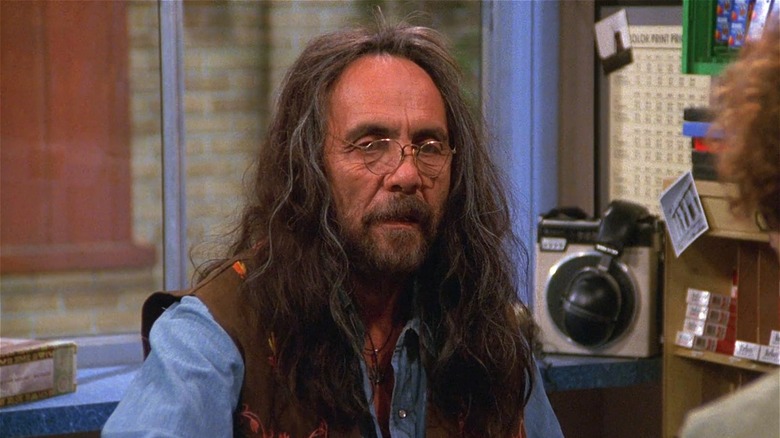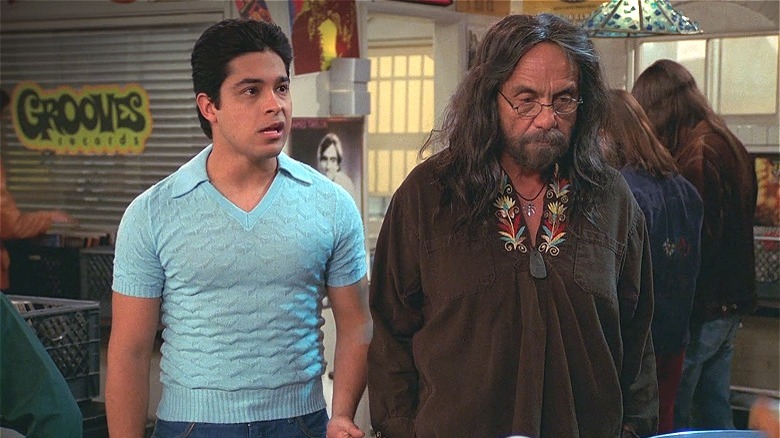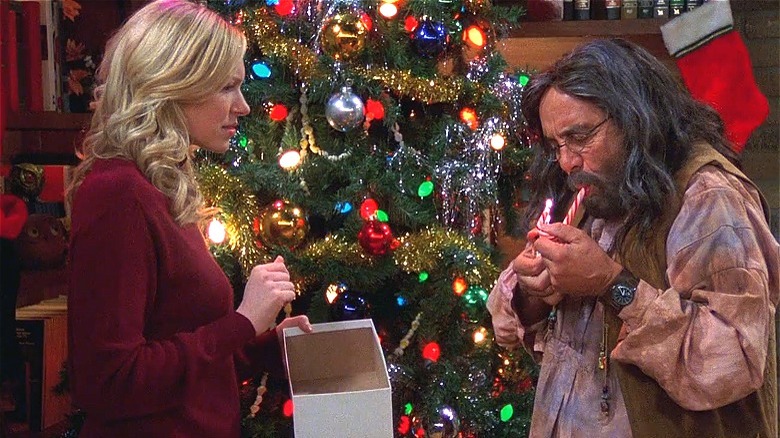Tommy Chong Thinks That '70s Show Helped Normalize His Subculture
Tommy Chong, or at least a character based on himself and baring the same name, once shared a tremendous nugget of heightened knowledge that will give future generations of humans a powerful thirst, and that is "Dave's not here, man." What this truly means is anybody's guess, though it surely has the power to unlock a laid-back attitude, a deep and ceaseless love of tie-dye shirts, and perhaps the occasional spiritual calling to a fast food restaurant. Joking aside, Chong and his early compatriot of Cheech Marin popularized a specific brand of comedy born of the experiences learned from the 1960s.
Having no qualms about expressing their love of the devil's lettuce, or marijuana in other words, Cheech and Chong released movies and records starting in the 1970s and quickly established a certain image in the public's eye. This is in stark contrast to some of the previous decades' attempts to portray marijuana users as violent attackers, catatonic zombies, or manic piano players. In other words, the perception of "stoners" took quite some time to finally become a bit more reasonable, and these days it doesn't take a felt black-light poster of a dragon and the entire Pink Floyd catalog to understand that maybe marijuana shouldn't be in the same class of substances as some of the hardest and deadliest drugs imaginable. Surprisingly, Chong believes that "That '70s Show" may have lent a more recent hand in this regard.
Chong's character of Leo in That '70s Show embodied several stoner tropes
Besides his history as one half of a stoner duo, Tommy Chong also appears in movies and television shows which usually allow the actor to channel what he is best known for — just think of his Yak character in "Zootopia." Chong is also a beloved fixture on "That '70s Show," getting credit for 65 episodes as Leo Chingkwake. The character of Leo exemplifies some of the stereotypical characteristics of marijuana use, played up for humorous effect. These include a rather spotty memory, a reluctance to work hard, and being easily confused or startled. However, Leo is also exceptionally friendly, outgoing, trusting, and open, which makes him somewhat of a glaring contrast with Red Forman (Kurtwood Smith).
In an interview with MovieWeb, Chong was asked what he thought resonated with audiences, and why "That '70s Show" is so beloved. Chong replied, "I represent culture that was demonized. Up until 'That '70s Show,' the whole marijuana thing was sort of demonized. By showing it the way they did it [on the show], I think the show was doing okay, but it wasn't killing it. Then the powers that be—the brains behind it all—said, 'We need something or have somebody that, you know, really says '60s and '70s.' So, they brought me in, and it got turned around."
Chong believes That '70s Show helped destigmatize the marijuana subculture
During his MovieWeb interview, Tommy Chong went on to explain the further significance of his role on "That '70s Show" as Leo. "And it wasn't so much my performance, as it was the mood, and what I brought to the show," he said. "I think what 'Cheech and Chong' did was show everybody that we're just normal people – everyday people trying to stay abreast with what's going on in the world. I think that's what happened [when I came on the show]." Perhaps what Chong is implying here is that being seen by a greater audience with "That '70s Show" may have helped people in the late 1990s realize that maybe marijuana wasn't so bad, and that actually somewhat tracks with the shifting public opinion at the time.
Although marijuana is still somewhat stigmatized by the federal government, which still lists the substance as a Schedule I drug, several states have passed laws that have allowed marijuana to be used in a medical setting, and some states have even made the drug completely recreational. The very first state to buck the federal prohibition of marijuana was California in 1996, which certainly highlights just how much public perception has changed, helped in part by movies and shows like "That '70s Show," "Half-Baked," and "Dazed and Confused." Considering that "That '70s Show" started a couple of years after California changed its stance on marijuana and set in motion the legalization process, perhaps Chong is on to something.


